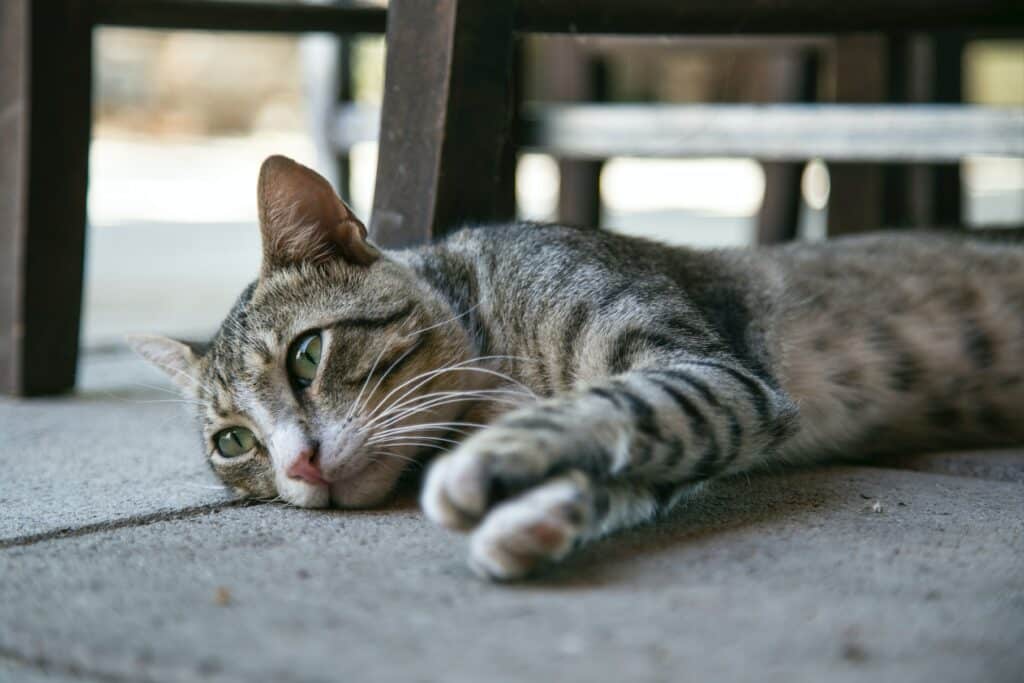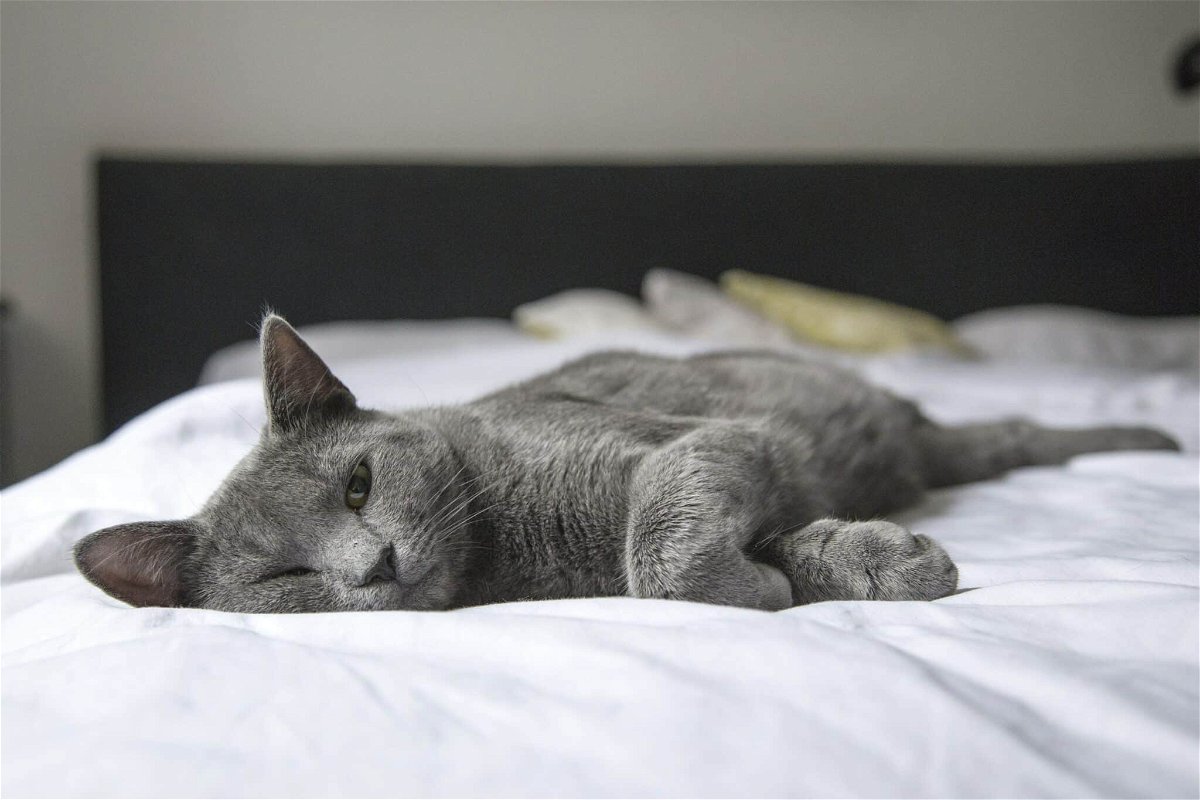We're an affiliate
We hope you love the products we recommend! Just so you know, we may collect a share of sales or other compensation from the links on this page at no additional cost to you. Thank you if you use our links, we really appreciate it!
As a pet parent, you must have had those moments where you’ve wronged your feline friend and probably wondered if they held a grudge against you. But just how long does a cat hold a grudge?
Be it an apparent punishment from their human guardians or a territorial dispute with other pets, cats have been known to get mad as an expression of their feelings.
Keep reading this post to discover the fascinating reasons why your cat may display negative feelings and some solutions you can put in place to make amends with your furry friend.
Do Cats Hold Grudges Against Humans?
Yes. Cats may hold grudges against their human guardians when they feel offended. This could be due to different reasons that hurt their feelings or emotions.

The good news is that the grudge will only run in the cat’s mind for a short period during which the offended feline will display signs of discomfort.
Do Cats Hold Grudge Against Other Cats?
Some cats could also hold resentments against their fellow felines although not in the manner they do to us.
Cats are highly territorial animals and they will get annoyed when a new cat gets into their space and snatches their resources or owners’ attention.
This will make the resident cat feel disgruntled and confront the newcomer cat bluntly. This action will lead to a recurring conflict and both cats may develop a grudge against each other.
If you don’t intervene to help the situation, such cats may develop a long-lasting hatred that will see them completely avoiding each other or fighting when they meet.
It’s important to know the personality of your furry friend because some of them are very social while others prefer a solitary life with minimal interference.
How Long Does a Cat Hold Grudge For?
Cats will generally have a short reaction time to perceived wrongdoings. They can quickly forget what just happened and move on to other things.
For example, if you accidentally pour some cold water on your cat, they will get offended for a moment but will quickly stop thinking about it when their coat is dried.
However, if you subject your cat to repeated negative actions such as mistreatment and punishment, they may hold a grudge against you for a long time. This could span anywhere between days to months unless something is done to solve the situation.
A long-lasting grudge will induce your cat to get furious and show aggressive behavior as a response to perceived abuse from you.
Why Do Cats Hold Grudges?
When a cat realizes that something or someone is hurting their feelings, they will respond by staying away or engaging in a fight.
They hold the grudge as a defense mechanism to help them prevent similar incidents from taking place in the future.
The other reason why cats may hold grudges is to assert their authority over their territory. Cats will feel infringed on when their spaces get occupied both by humans and other pets.
In most cases, they will respond to such situations by becoming defensive and assertive to regain control over their territory.
We can therefore say that cats will display some feelings of resentment as a way of expressing their minds toward a negative experience.
Do Cats Have a Good Memory?
Cats, like humans, have both short-term and long-term memories. Their memory span is surprisingly good enough although not as sophisticated as that of humans.
The cerebral cortex is part of the cat’s brain that is responsible for storing and recollecting information. It helps the cat to learn, memorize, and to make decisions.
Short-term memory in cats is brief but it allows them to solve their day-to-day problems by committing to that which is required of them.
For example, if you place your cat’s food bowl in a certain place (different from their regular feeding spots), they will recall that place and come back to it if they didn’t clear the bowl.
This is the cat’s short-term memory in action. It allows them to recollect the brief experiences they had moments ago and it can build up to become a long-term memory if it is so important to them.
The span of long-term memory will differ in every cat. This includes some of the recollections kept in mind since kittenhood and it can also span into their elderly years.
The cat’s long-term memory is responsible for storing vital information in their lives such as the important people around them, their best moments, their trained habits, and past trauma as well.
This explains the reason why a cat may be reluctant to walk into a certain path while they are willing to walk on others They had different experiences in both routes, and it is written in their brains.
Do Cats Remember Traumatic Events?
Cats can remember the specific details of a traumatic event and they will react negatively when they experience identifiable triggers in the future.
Cats are known to build very strong associations with both positive and negative experiences in their lives. This is what makes it possible to train and retrain them.

Studies have found that cats can also suffer Post Traumatic Stress Disorder (PTSD) in response to an extremely negative experience.
When a cat suffers a terrifying experience, they will associate all the people, sights, sounds, and smells related to the event with an undesirable outcome.
The good news is that PTSD can be cured by helping your cat to forget their past upsetting events with the help of a qualified vet and an expert in feline behavior.
Signs Your Cat Is Angry at You
When your furry friend holds a grudge against you, they will show it verbally and in their body language. The following are some of the signs to look out for:
- Staring at you for a long time
- Scratching & biting you
- Ignoring you
- Excessive meowing
- Hissing
- Refusing to eat
- Refusing to be petted
- Hiding under the couch or bed
- Showing unwanted behavior
- Not using the litter box
- Arched back
- Dilated pupils
Caution
It’s important to note that some of these signs will indicate more than just anger from your cat. You should take the disturbed feline to the vet for them to rule out any medical condition that may cause your lovely kitty to show unwanted behavior.
How Do I Say Sorry to A Cat?
If you accidentally step on your cat’s tail, they may not take immediate offense against you. But hey, you need to admit the mistake and apologize.
So how do I say sorry to a cat when we speak different languages? Here’s how:
The first thing is to give the offended kitty some space and time to cool down. Don’t pick up your furry friend immediately after crossing their path. They might read the move wrongly and you could be at risk of being bitten or scratched.
Once your cat has cooled off, you can follow them and hand over a tasty treat to their mouth while saying the word ‘sorry’ in a low tone.
This will help in creating a positive association and your furry friend will start to see that you never meant any harm to them.
After you have apologized to your cat and given them a cool atmosphere to get easy, you can extend a hand (literally) to them for some petting.

If the cat reacts negatively by hissing, moving away, or scratching your arm, then this is a sign that they have not healed and you better give them more space and time.
But if they accept your hand with a good gesture like smelling and rubbing it, then you can pick them up and give them a smooth petting session.
Once you’ve confirmed that your feline is no longer mad at you, you can then bring in a toy and engage them in a game.
Share these happy moments with your cat and let them know that you were not offending them deliberately.
FAQs
1. How long will my cat get angry at me?
The duration your gorgeous feline will get mad at you will vary depending on their personality, the harshness of what you did, and whether you apologized or not.
Some cats will take a perceived offense lightly while others may hold onto a grudge for a long time especially if it was done deliberately.
2. Can cats get their feeling hurt?
Cats, just like humans, can get their feeling hurt. They are super-sensitive and emotional animals who can experience a range of feelings including happiness and sadness.
If a cat’s feelings are hurt, they will exhibit their emotions in both verbal and non-verbal cues such as meowing, hiding, and showing unwanted behavior.
3. Will a cat forgive you for hitting it?
If you’ve hit your cat either by mistake or otherwise, they may be generous enough to forgive you and forget about it. Yes, you’re that special! But it may cost you their trust and this may require more time to rebuild.
The time it takes for cats to forgive a deliberate offense will vary depending on the individual cat, the severity of the said mistake, and if it has been recurring for some time.
Please note that it is never appropriate to hit a cat no matter the wrongful act you think they did.
Getting physical on your furry friend is cruel and it may leave a long-lasting dent in your relationship with them aside from causing wounds.
Conclusion
Yes, cats can indeed get mad at you and give you a cold shoulder due to perceived offenses.
And on the question of ‘How long does a cat hold a grudge’ we have seen that it will depend on the perceived wrongdoing and how you stepped in to remedy the situation.
You should be bold to own up to your mistake and apologize to your cat before they build a long-lasting grudge against you.
Saying sorry will help to rebuild your relationship with the cat and ease them in forgetting their hurt feelings.

Justus is the lead author at Furs'n'Paws. He is not only a passionate animal lover but also an experienced pet writer and editor with several years of expertise in the field. With a keen understanding of animal behavior and a talent for interpreting the puzzling body movements of pets, he has developed a deep passion for sharing his insights and experience with his readers. Justus is experienced in researching and reviewing pet products, and putting together product reviews and buying guides. He is dedicated to helping pet owners provide the best for their furry companions. His wealth of knowledge and love for animals make him a trusted resource in the pet community.



No responses yet